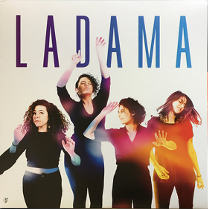The Graham Album Review #1912

Click on CD Cover for Audio Review in streaming mp3 format | |
Ladama: Ladama
by George Graham
(Six Degrees Records As broadcast on WVIA-FM 9/4/2017)

Click on CD Cover for Audio Review in streaming mp3 format | |
Ladama: Ladama
by George Graham
(Six Degrees Records As broadcast on WVIA-FM 9/4/2017)
An excellent antidote to the vile xenophobia and so-called “nationalism” that has been used by some to gain political power, and wealth through the media, is cross-cultural music. With the Internet having made the world a very small place in terms of communications, musicians have been taking advantage of the opportunities it presents to collaborate, either in person or virtually, to mix previously disparate styles and cultures. An excellent example of that has been the Playing for Change projects created by field recordings of musicians adding their parts of various songs in various locales around the world. Peter Gabriel also sponsored the Big Blue Ball project with musicians from different continents converging on his studio.
This week we have a recording called Ladama by women from four different countries in the Americas, making music that nicely combines influences, and sometimes goes in unexpected directions. The members are from the Brazil, Colombia, Venezuela and the US, and the group was founded originally as an educational and cultural exchange project.
Ladama’s members are Lara Klaus from Recife, Brazil; Daniela Serna, from Bogotá, Colombia; Maria Fernandez Gonzalez, otherwise known as Mafer Banola, from Barquisimeto, Venezuela. The first letters of their respective first names were combined to spell out Ladama, which also means the lady in Spanish. They were joined by Brooklyn, NY-based singer and songwriter Sara Lucas who has been part of a band named Callers. They met in 2014 at an event supported by the State Department’s Bureau of Educational and Cultural Affairs, which involved fellowships and a residency where the members can collaborate. They later received grants to take their performances to their respective countries in North and South America and hold workshops for students. They have since continued their collaboration and eventually raised the resources to make their album through crowd-funding. Their main focus in performance remains outreach to youth and their message is also toward combating gender inequality.
The members are mostly0 multi-instrumentalists, and they bring to the project instruments known in their national musical culture, such as the bandola llanera from Venezuela, Brazilian percussion and some Colombian instruments. Their lyrics are in English, Spanish and Portuguese, and while the material is generally upbeat and danceable, Ladama can move to laid-back material. The members are joined by a some additional players including a rhythm section and horns. The vocalists’ styles are quite different and that is reflected in their sound.
Opening is a piece called Porro Maracatu, which was co-written by Daniela Serna from Colombia. It comes at us at a kind of frenetic pace, with some of the Spanish lyrics delivered rap style. <<>>
Agreste is a piece by Maria Fernandez Gonzalez, featuring the bandola llanera, the instrument on which Ms. Fernandez Gonzalez has specialized. There’s a wordless vocal by the American Sara Lucas. <<>>
Ms. Lucas is the lead vocalist for the one cover tune on the album, Compared to What a piece by Gene McDaniels made famous in the early 1970s by Les McCann and Eddie Harris in a jazz setting. Ladama give it a decidedly different spin, with a darker musical complexion. <<>>
In Portuguese is a composition by Lara Klaus called Elo, which has a more traditionally Brazilian samba-influenced sound. It’s one of the most musically attractive pieces on the album. <<>>
All four of the members of Ladama contributed to the composing of Night Traveler and the track nicely reflects the cross-cultural makeup of the group. <<>>
Another worthy cross-cultural aggregation comes on the track Sin Ataduras, which translated as “No Strings Attached,” written by Ms. Serna, the Colombian in the group. It’s upbeat and has elements of Brazilian, South American and alternative rock. <<>>
Also by Ms. Serna is Cumbia Brasileira, an eclectic bu very danceable piece, which as the title says combines the Latin American cumbia style with Brazilian samba elements. <<>>
The album ends with a Brazilian-American fusion piece called Atravessadora by Ms. Lucas and Ms. Klaus. The lyrics are in English and get into the social consciousness that has been part of the group’s purpose. The mostly percussion accompaniment makes for a distinctive sound. <<>>
Ladama, the eponymous album by the international quartet of women from Brazil, Colombia, Venezuela and the US, is an enjoyable and musically infectious release that is another reminder of the good things than can happen when ethnicities and cultures collaborate and mix. Their music creatively reflects their cultural backgrounds, with a contemporary spin. The mostly original compositions take advantage of that, and generally succeed with a fresh sound that shows imagination.
Our grade for sound quality is a B-plus. Most of the recording is fairly clean, though some of the tracks, especially where the vocals are rapped, have apparently intentional distortion, perhaps to emulate overdriven analog equipment. Though that kind of thing seems to be trendy, it’s inexcusable in my book. The recording’s dynamic range is also disappointing.
Mixing musical cultures can sometimes be a recipe for bad music, but in the proper hands and with a good dose of creativity, the sound can be both interesting and quite enjoyable. That’s a good description of the new album by Ladama.
(c) Copyright 2017 George D. Graham. All rights reserved.
This review may not be copied to another Web site without written permission.
 To Index of Album Reviews | To George Graham's Home Page. | What's New on This Site.
To Index of Album Reviews | To George Graham's Home Page. | What's New on This Site.